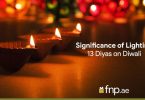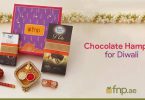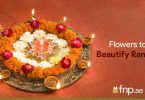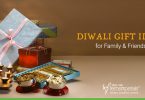Diwali, the Festival of Lights, is one of the most significant occasions for Indians worldwide. Rooted in the triumph of good over evil and light over darkness, the festival transcends religious boundaries to symbolise hope, positivity, and togetherness.
In the Middle East, Diwali holds a special place due to the presence of a large Indian diaspora spread across the UAE, Oman, Bahrain, Qatar, and Saudi Arabia. Over the years, the festival has grown from being a family tradition to a multicultural celebration that unites communities of different nationalities and faiths. Today, Diwali in the Middle East is not just a festival for Indians, it is a shared cultural experience that brings people together.
1. Diwali in the Middle East: A Festival Beyond Borders
The Middle East is home to millions of Indians who have carried their traditions and customs with them. In cities such as Dubai, Abu Dhabi, Doha, and Muscat, Diwali is celebrated with grandeur, often resembling the vibrancy seen back home in India.
What makes Diwali here unique is its inclusive nature. From local Emiratis and Arabs to Western expatriates, many non-Indians eagerly participate in the festivities. Public celebrations, light shows, and Diwali markets have transformed the festival into a cross-cultural event. These gatherings highlight the spirit of unity in diversity, showcasing how Diwali is now celebrated beyond the confines of the Indian community.
2. Cultural Exchange Through Diwali Celebrations
Diwali in the Middle East serves as a bridge between communities. Schools often hold Diwali assemblies where children of different nationalities dress in traditional attire, apply henna, and exchange Diwali sweets. Offices host cultural events where employees celebrate together with rangoli competitions, music, and dance.
Cultural centres across the Gulf also organise Diwali fairs, highlighting Indian traditions while encouraging participation from other communities. Whether it is an Emirati family trying on saris, Arab neighbours relishing jalebis, or Western expatriates lighting diyas, these moments of cultural exchange strengthen bonds and foster understanding.
3. Role of Food & Gifts in Multicultural Diwali

Source: fnp.ae
Food and gifting are at the heart of Diwali celebrations, and in the Middle East, they become instruments of cultural sharing. Indian families often distribute traditional Diwali sweets such as laddoos, barfis, and gulab jamuns to their Arab and Western neighbours. Chocolates and festive hampers are also popular, ensuring inclusivity for those unfamiliar with Indian treats.
Interestingly, Middle Eastern flavours have found their way into Diwali gifting. Dates and nuts, which hold deep cultural significance in Arab traditions, are now widely exchanged during the festival. Popular choices include Delightful Premium Dates Boxes, Stuffed Dates and Chocolate Platters, and the Mixed Dry Fruits Platter by Wafi. These items not only cater to local tastes but also symbolise the blending of Indian and Middle Eastern cultures.
Corporate gifting has also become a key trend during Diwali in the region. Companies present festive hampers to clients and employees, reflecting inclusivity and appreciation while aligning with the festive spirit.
4. Public Celebrations and Community Events
The scale of Diwali celebrations in the Middle East continues to expand each year. Dubai and Abu Dhabi host spectacular Diwali fairs featuring cultural performances, live concerts, and food stalls. Doha and Muscat also light up with Diwali bazaars, drawing participation from diverse communities.
Fireworks and dazzling illuminations at iconic landmarks, such as the Burj Khalifa in Dubai and the Corniche in Abu Dhabi, make the celebrations even more memorable. Shopping festivals and retail promotions tied to Diwali attract multicultural crowds, further reinforcing the festival’s significance in the region’s social calendar.
5. Spirituality and Shared Values
While Diwali is often associated with lights, sweets, and gifts, its spiritual message resonates universally. The triumph of light over darkness and good over evil speaks to people of all cultures.
In the Middle East, Diwali finds parallels with traditions that emphasise light, unity, and togetherness. For instance, the symbolic lighting of lamps during Diwali mirrors the cultural importance of illumination in Arab customs. The shared values of family, gratitude, and community resonate deeply across cultures, making Diwali a festival that is celebrated with mutual respect and appreciation.
Conclusion
Diwali in the Middle East has grown beyond being an Indian festival; it has become a multicultural event that symbolises harmony, inclusivity, and unity. From exchanging Diwali gifts to sharing traditional sweets and participating in public festivities, people from diverse communities come together to celebrate the spirit of light and togetherness.
In an increasingly globalised world, such festivals play a vital role in bridging cultural divides. Diwali in the Middle East stands as a shining example of how traditions can transcend borders to foster understanding and strengthen bonds among communities.
FAQs
Q1. Why is Diwali widely celebrated in the Middle East?
Due to the large Indian diaspora, Diwali has become a significant cultural and social festival across the Gulf countries.
Q2. Do local Arab communities participate in Diwali celebrations?
Yes, many Emiratis and Arab families join Indian friends and neighbours in festivities, enjoying sweets, decorations, and cultural events.
Q3. How is Diwali different in the Middle East compared to India?
While family traditions remain similar, Middle Eastern celebrations are more multicultural, with public events and diverse participation.
Q4. Are there public Diwali events in Dubai and Abu Dhabi?
Absolutely. Both cities host Diwali fairs, fireworks, and light shows that attract locals, expatriates, and tourists alike.
Q5. What role do gifts play in multicultural Diwali celebrations?
Diwali gifts, from sweets to premium date boxes, symbolise sharing, inclusivity, and appreciation across cultures.
Shop For Diwali Occasion
Diwali Gifts | Diwali Flowers | Diwali Cakes | Diwali Sweets | Diwali Diyas | Diwali Candles | Diwali Chocolates | Diwali Gifts Hampers








